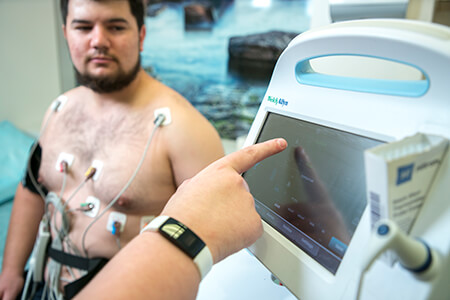
Recognising the early signs of heart disease and early signs of lung disease can be lifesaving. Often, small changes in your health could indicate a developing condition, and early intervention can significantly improve outcomes.
By being aware of these symptoms of heart and lung disease, you can take proactive steps towards diagnosing heart and lung problems and seeking timely medical care. SmartCare Diagnostics’ early detection services can help ensure that minor issues don’t turn into serious health complications.
10 Signs of Cardiovascular and Pulmonary Disease
- Chest Discomfort of Pressure
A feeling of tightness, pressure, or pain in the chest could be a sign of cardiovascular disease or an issue with the lungs. While not all chest discomfort signals a heart disease, it should never be ignored.
- Shortness of Breath
Experiencing shortness of breath, especially during mild activity or while resting, could indicate heart failure or lung disease such as chronic obstructive pulmonary disease (COPD).
- Persistent Cough or Wheezing
A cough that doesn’t go away, especially if accompanied by mucus or wheezing, may point to lung conditions like asthma, bronchitis, or early signs of lung disease such as pulmonary fibrosis.
- Fatigue or Unexplained Weakness
Feeling excessively tired without a clear reason can be an early symptom of both heart and lung health issues, such as heart failure or chronic lung disease.
- Swelling in the Legs, Ankles, or Feet
Fluid retention in the lower limbs could indicate poor circulation, a sign of heart disease or lung disease-related complications like pulmonary hypertension.
- Irregular Heartbeat or Palpitations
Feeling your heart race, skip beats, or flutter can signal arrhythmias, which may increase the risk of stroke or heart failure.
- Dizziness or Light-Headedness
Sudden dizziness can be linked to heart disease due to reduced blood flow to the brain or lung problems affecting oxygen levels.
- Frequent Upper Back of Jaw Pain
Pain in the upper back or jaw—particularly in women—can be a subtle symptom of heart and lung disease, often associated with heart attacks or angina.
- Chronic Snoring or Sleep Disturbances
Obstructive sleep apnoea, often marked by loud snoring and breathing interruptions during sleep, increases the risk of heart failure and other cardiovascular and pulmonary diseases.
- Bluish Tint to Lips or Fingernails
A bluish hue to the lips or nails could indicate low oxygen levels, often a result of lung disease or poor heart function.
How to Respond to Concerning Symptoms
It’s important to know when to see a doctor for heart health and lung health. If you experience any of these symptoms of heart and lung disease, schedule an appointment with a doctor. If symptoms persist or worsen, scheduling a check-up is essential. Seek immediate medical attention if you experience severe chest discomfort and shortness of breath, sudden dizziness, or swelling that rapidly increases.
The Role of Diagnostics in Early Detection
Diagnosing heart and lung problems early is key to managing and treating these issues before they become severe. At SmartCare Diagnostics, we offer a comprehensive range of diagnostic tests designed to detect potential problems at an early stage.
For heart health, our services include echocardiograms, which provide detailed imaging of the heart’s structure and function, and electrocardiograms (ECG) to monitor heart rhythms and detect irregularities. We also offer advanced cardiac stress tests to assess how well the heart performs under exertion.
For lung health, we provide pulmonary function tests to evaluate lung capacity and airflow, as well as imaging tests like X-rays and CT scans to help diagnose lung conditions. These assessments allow our specialists to identify early signs of lung disease and recommend appropriate treatment plans tailored to individual needs. By utilising state-of-the-art diagnostic tools, SmartCare Diagnostics’ early detection services encourage patients to take proactive steps in managing heart and lung health effectively.
Preventive Health Tips for Strong Heart and Lung Health
To maintain optimal heart and lung health, consider these lifestyle tips:
- Eat a balanced diet rich in fruits, vegetables, whole grains, and lean proteins. Reduce saturated fats, salt, and sugar to protect your heart and lungs.
- Stay active with at least 150 minutes of moderate exercise per week, such as walking, swimming, or cycling. Regular activity helps strengthen the heart and improve lung function.
- Avoid smoking and limit alcohol intake, as tobacco and excessive alcohol use are major risk factors for cardiovascular and pulmonary disease.
- Manage stress through relaxation techniques like meditation, deep breathing, or yoga. Chronic stress can elevate blood pressure and contribute to heart disease.
- Maintain a healthy weight, as excess weight can put additional strain on your heart and lungs.
- Get regular check-ups, including screenings for blood pressure, cholesterol levels, and lung function tests to detect issues early.
- Stay hydrated, as dehydration can affect circulation and lung function.
- Prioritise quality sleep, since poor sleep is linked to higher risks of heart disease and respiratory issues.
- Avoid exposure to pollutants by ensuring good air quality in your home and workplace and wearing protective masks when necessary.
Ignoring these signs of heart disease or warning signs of lung disease can lead to severe complications, but early detection can save lives. If you or a loved one experience any of these subtle symptoms of heart and lung disease, don’t wait—schedule a consultation at SmartCare Diagnostics to ensure peace of mind and a healthier future.
Why wait or pay too much for diagnostic tests?